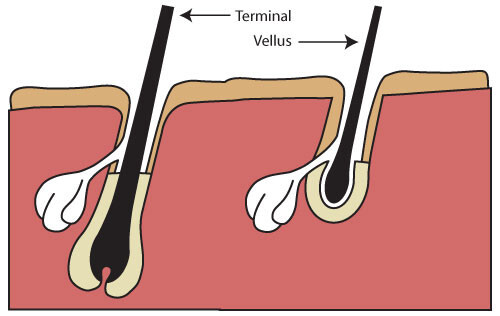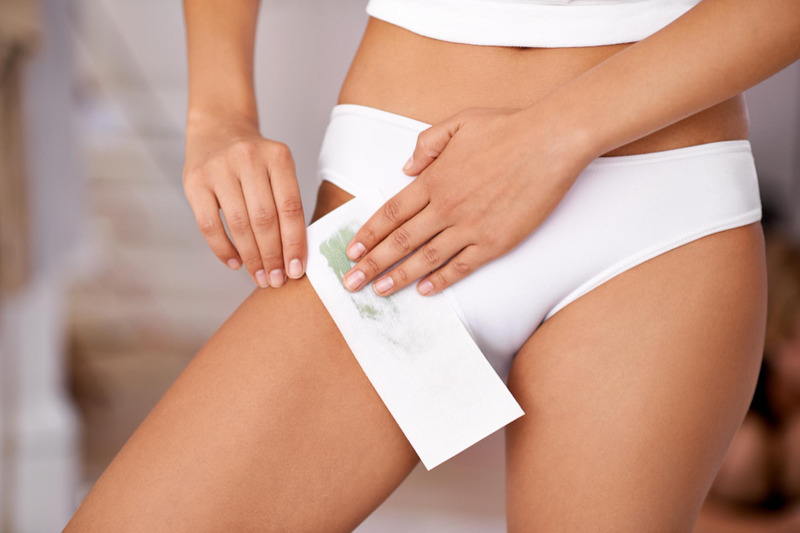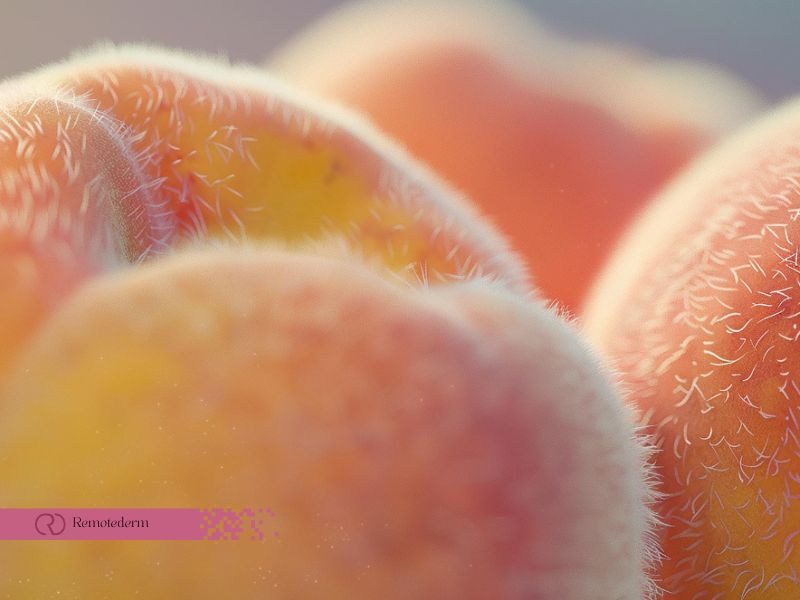Vellus hair is often overlooked when talking about hair care, yet it plays a significant role in our overall skin health. These fine, soft hairs are found all over your body and serve important functions. In this guide, we’ll break down what vellus hair is, its role on the face, and how to care for it, especially in Canada’s unique climate.
What Is Vellus Hair?
Vellus hairs are the soft, light-colored, and barely noticeable hair that covers most of the body. Unlike terminal hair—the thicker, darker hair on your scalp, underarms, and other areas—vellus hair is much finer and shorter.
Key Differences Between Vellus and Terminal Hair:
To better understand vellus hairs, it’s helpful to compare it directly with terminal hair, which differs in several significant ways:
- Thickness: Vellus hairs are thin, while terminal hair is thicker and pigmented.
- Length: Vellus hairs stay short, whereas terminal hair grows longer.
- Location: Vellus hairs cover most body areas except palms, soles, and lips.
In Canada, seasonal changes can impact vellus hair’s visibility and texture, with colder weather often making it more prominent.

The Role of Vellus Hair on the Face
Many people notice vellus hair on face, especially under bright light or when applying makeup. While it might seem insignificant, it ha essential roles:
- Skin Protection: Vellus hair helps shield the skin from minor abrasions and environmental irritants.
- Temperature Regulation: It aids in regulating body heat by providing a slight layer of insulation.
- Oil Distribution: Vellus hairs assist in spreading natural oils, keeping the skin moisturized.
- Sensitivity Indicator: Vellus hairs can act as a sensory mechanism, helping detect subtle changes like light touch or temperature shifts.
Common Concerns About Vellus Hair
Though vellus hairs are natural, it’s often a topic of concern for people seeking smooth, flawless skin. Here’s what you should know:
Is Removing Vellus Hair Safe?
Yes, but it depends on the method you choose and how suitable it is for your skin type and needs. Common options include:
- Dermaplaning: Removes vellus hair and exfoliates dead skin cells.
- Waxing: Effective but can be harsh on sensitive skin.
- Threading: Precise and ideal for smaller areas like the upper lip.
- Laser Hair Removal: Generally not effective for vellus hair due to its lack of pigment.
Always consult a hair loss dermatologist or esthetician before starting a new hair removal routine.
Will Vellus Hairs Turn into Terminal Hair?
This transition typically happens due to hormonal changes, such as during puberty or medical conditions like PCOS. If you’re worried about excessive hair growth or loss of hair, speaking with a hair loss dermatologist in Canada who knows the ins and outs of growing hair is a good idea.

Caring for Vellus Hairs in Canada’s Climate
Canada’s harsh winters and humid summers can impact your skin and hair care routine. Here’s how to adapt:
Winter Care Tips
- Moisturize Regularly: Use rich, hydrating products to prevent dryness.
- Exfoliate Gently: Remove dead skin cells to avoid buildup around vellus hairs.
- Protect Your Skin: Wear scarves and hats to shield your face from windburn.
Summer Care Tips
- Stay Hydrated: Drink plenty of water to maintain skin elasticity.
- Use SPF: Apply sunscreen daily to protect skin and vellus hair from UV damage.
- Cleanse Thoroughly: Sweat and oil buildup can trap dirt around vellus hairs.
Myths About Vellus Hairs
There’s a lot of misinformation about vellus hairs. Let’s clear up some common myths:
- Shaving Makes It Thicker: False. Shaving doesn’t change the structure of the hair; it only blunts the ends, making it feel coarser temporarily.
- Removing Vellus Hair Is Necessary: False. Unless it’s a personal preference, vellus hair doesn’t need to be removed.
- It Serves No Purpose: False. As mentioned earlier, vellus hair plays a role in protecting and maintaining healthy skin.
Final Thoughts
Vellus hair might seem like a minor detail, but it’s a vital part of your body’s ecosystem and plays a role in maintaining overall skin health. Whether you’re embracing it or opting for removal, understanding its role helps you make informed decisions about skincare and hair care. For those in Canada, adapting your hair care routine to the climate is key to maintaining healthy skin and hair year-round.
FAQs
Can vellus hair cause acne?
While vellus hair itself doesn’t cause acne, trapped oils and dead skin around the hair can lead to clogged pores and breakouts.
Is it normal to have vellus hair on the face?
Yes, it’s entirely normal. Everyone has vellus hair, though it may be more noticeable in some individuals.
Can diet affect vellus hair growth?
A healthy diet rich in vitamins and nutrients supports overall skin and hair health, but it’s unlikely to change vellus hair significantly.
Are there medical conditions related to vellus hair?
Yes, conditions like hirsutism or hormonal imbalances can affect vellus hair growth. A visit to a hair loss dermatologist can provide clarity.
